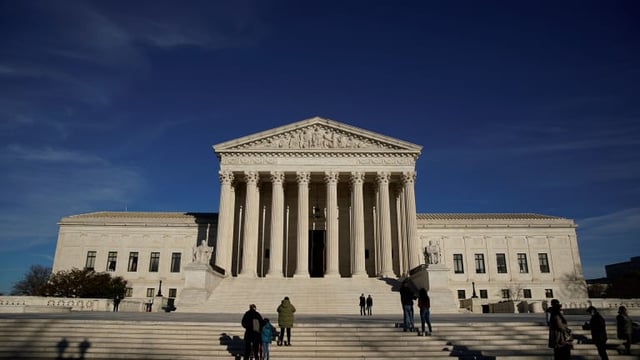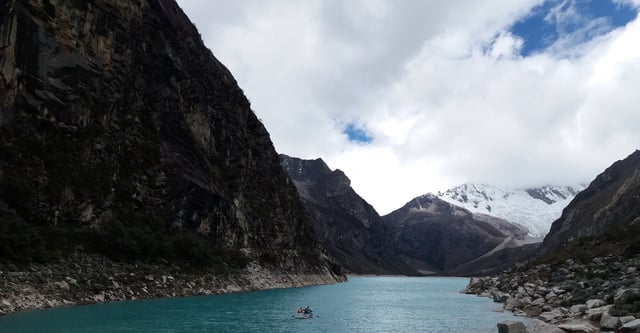Drilled • Season 11 Episode 8
Damages: New Evidence and an Update on U.S. Climate Cases
About This Episode
Transcript
Amy Westervelt: [00:00:00] Hello and welcome back to Damages, the Law Focused podcast from Drilled. We have a new season coming June 3rd, all about the energy transfer versus Greenpeace case and the Countersuit in Europe where Greenpeace has invoked the eus anti SLAPP statute to sue energy transfer for harassment. It is a complicated and fascinating story and I cannot wait for you to hear it. In the meantime, I wanted to bring you an update on climate cases in the us, especially given some of the recent efforts by the Trump administration to quash some of them. To help me out with that, I've got Kathy Mulvey with the Union of Concern Scientists here today.
Kathy is the accountability campaign director at UCS, which just released a report called Decades of Deception that pulls together in one place, all the primary documents out there showing what the fossil fuel [00:01:00] industry knew about climate change, when it knew it, and what they did with that information.
You might think you already know this story, I thought I did, but I learned a few things and I hope you will too.
[music up]
Amy: I've read the report super interesting and I have a bunch of questions for you, but I wanna start with the question I expect to get from people, which is okay, what's new? What's new that we didn't already know in this report? What do you wanna point people to on that front?
Kathy Mulvey: Yeah, so what's new is really that, we've put these documents together in a coherent narrative. So, you know, these are primary sources about what major fossil fuel corporations knew when about the harms that their products would cause to climate [00:02:00] and our society and what they did in spite of what they knew.
So, you know, it's the physical and natural science basis both how the companies were aware of and even conducting some of that internally. Also the basis of climate attribution science as that field has been developing. It's also the historical track of disinformation over the decades from the outright climate science denial to how that has become greenwashing, distraction, delay and even efforts to intimidate climate advocates. So, you know, one part of the story that is still developing relates to a hacking scheme that targeted some staff members [00:03:00] at my organization, the Union of Concerned Scientists, and several other public interest organizations working to hold fossil fuel companies accountable for their role in climate change.
Amy: Yeah. , I'm gonna ask you about more details about that whole unfolding story in a minute too, because it's fascinating. But first , I'm curious about, well, to your point just a minute ago as I was reading this, I was like, actually I think this is the first I've seen of a report that does combine all of these things in one place. And then am wondering about the timing, what drove the desire to release this now?
Kathy Mulvey: You know, I've been working with the Union of Concerned Scientists now for almost 10 years, and one of the first projects that I undertook, actually the first project I undertook was the 2015 Climate Deception dossiers in collaboration with my former colleague Seth [00:04:00] Schulman who had years before that authored the publication Smoke Mirrors and Hot Air that shows how the fossil fuel industry has employed many of the same strategies and tactics, even some of the same front groups and scientists as the tobacco industry. And so, there are a few factors here. The advances in US climate accountability litigation against major fossil fuel corporations over climate deception and damages. And, much of that really relies on evidence of disinformation and deception campaigns and many of the documents that are referenced here in the report. And now of course the threat that the Trump administration and a fossil fuel friendly [00:05:00] congress pose to efforts to hold the fossil fuel industry accountable and to the advances , the hard fought advances to bend the global warming emissions curve down and accelerate the the clean energy transition really mean that the, the timing is important. We need this evidence to be easily accessible and the story to be told in a way that people, policymakers, litigators, shareholders, and investors can really access it.
Amy: Yeah. Okay. I know this is a big question and we could probably spend an hour talking just about this, but I'm hoping you can give folks a little bit of a summary of where we're at right now with the threats from Trump you know, which states have been sued to try to stop these cases or super polluter laws from going [00:06:00] forward.
And to the extent that we know so far, what has the result of that been? Have there been, you know, cases thrown out? How is the litigation responding to this, this attempt to really quash these cases?
Kathy Mulvey: Yeah. So, we know that during his campaign Trump both expressed opposition to efforts to hold the fossil fuel industry liable for climate change and also sought to, raise a billion dollars from the fossil fuel industry.
And we've seen the fossil fuel industry have access to the Trump administration and Congress. And there have been multiple moves and one relates to the state level efforts to hold fossil fuel corporations accountable.
So, president Trump issued an executive order that attacked [00:07:00] states rights to hold fossil fuel companies accountable through legislation and. Litigation you know, among other efforts that states are pursuing for environmental justice. That was one part of that.
And we have already seen the Department of Justice take. Action by suing preemptively, actually Hawaii and Michigan before they filed climate accountability litigation. And, you know, Hawaii went ahead and filed its lawsuits, so was not intimidated by that action. The administration also sued vermont and New York State over their climate Superfund laws that is laws designed to make fossil fuel polluters pay for their role in climate harms. And so, that's one way that we are already seeing this administration take [00:08:00] action.
We know these cases are advancing in state courts around the country where they were filed. And as you've covered, you know, the fossil fuel industry has sought for up to eight years in, in some of the cases to, to use procedural maneuvers to keep them from getting into the courtroom and being heard on their merits. And this kind of effort through a friendly administration to throw a wrench in the advance of those cases really indicates what a threat that litigation poses to the fossil fuel industry.
So that's one big part of of how we've seen the Trump administration taking the side of the fossil fuel industry. And, I should say the backdrop to all of this is that all of us are experiencing climate impacts in our day-to-day lives, right?
And we're increasingly aware of the [00:09:00] preventable harms that have been worsened by this industry's deception campaign. So, you know, another thing to talk specifically about in terms of the interventions on the side of the fossil fuel industry is the Securities and Exchange Commission last year issued a final rule on on corporate climate disclosure. And this was, after many years, and it was significantly watered down from what it could have been, but it would compel publicly traded companies to assess and report on how climate change will affect their bottom lines and by extension investors and the public. And part of the story that that we're telling in decades of deceit is how industry groups that are heavily influenced by the fossil fuel industry [00:10:00] like the US Chamber of Commerce have, sought to, to water down that rule and then sued to block its implementation.
And the Securities Exchange Commission under Trump has indicated that it won't defend those rules. So that vital information for shareholders and investors to have is now not on getting access to that information through the SEC is not on the timeline that it could have been.
Amy: I wanna ask you too about how this all kind of fits into the global context because, you know, these are global companies. This evidence is potentially useful outside of the country as well. Do you have any thoughts on whether these companies that are getting a huge helping hand by the US government could end up being held accountable somewhere else?
Kathy Mulvey: Yeah, that's a really good point that, the companies that we're looking at in this report, [00:11:00] so ExxonMobil, Shell in particular but they, the members of the American Petroleum Institute are global in scope. And so, , the evidence of the deliberate campaign of disinformation, dating back as far as 50 years, and, in terms of the renowned scientists, Dr. Edward Teller briefing executives at an American Petroleum Institute event in 1959. You know, and then, and then looking forward to the early 1980s I mean this is a really critical point where major fossil fuel companies had really amassed a remarkably detailed understanding of the potentially catastrophic effects of their products for people on the planet.
And it's worth noting that according to , the data set of the. Carbon [00:12:00] majors that's hosted by Influence Map 122. Oil, gas, coal and cement companies are responsible for 75% of all industrial carbon dioxide emissions since 1981. So, you know, in terms of the consequences of the deception and disinformation and delayed action in the US and globally those kinds of numbers are enormously significant.
Amy: Okay. I wanna have you walk us through this hacking story.
There've been a couple of bits of reporting on this that have come out as we learn more. But if you could just sort of summarize it for people, what happened here and what do we know so far?
Kathy Mulvey: Yeah. So, this information has been coming into the [00:13:00] public. Into the public domain for a few years now. Right? So we know that between 2015 and 2018 hackers attempted to infiltrate the email accounts of. Key staff members at the Union of Concerned Scientists and several other nonprofits.
And, through a report published by the Citizen Lab in 2020, we learned about that spear phishing campaign. And actually one person has pleaded guilty in connection with that campaign, right? A Israeli. Private investigator named Abam Azari and the US Government's sentencing memo for him in 2023 said that published articles about documents that were stolen and [00:14:00] and leaked through the hack really appeared to be designed to undermine the integrity of work by State Attorneys General to hold ExxonMobil accountable and also to attack the, the credibility of some of the individual targets of the hacking scheme. So, that information has been out there for a little bit of of time. Just this year new evidence has come to light through US government filings and and through further investigative journalism. And those court documents related to an attempt to extradite Amit for who's another accused mill middleman in this operation. They, this suggests that the US government has evidence that the criminal scheme was indirectly paid for [00:15:00] by ExxonMobil.
And that one of ExxonMobil's then lobbying firms the Washington DC based DCI group provided a list of targets to a middleman linked to the hackers and allegedly sent the fruits of the hacking to the oil and gas company. So, you know, this is the this is unprecedented, I think, in terms of fossil fuel accountability.
I know from work on the tobacco industry decades ago that the tobacco companies conducted surveillance and sought to infiltrate. Not only public health and public interest organizations, but the World Health Organization, its itself. So, the latest development was at the end of April, the UK court did order the extradition or agreed with the, the [00:16:00] order to extradite it for lit to the us. He does have the possibility of appeal and, we expect that he may, you may seek to appeal that decision but these revelations and the latest step in the process have really been an important step toward accountability and toward getting to the bottom of this hacking scheme.
You know, who hired and paid for these hackers.
Amy: I worked on a story recently where we were looking at. How chemical companies do this too. I feel like it's become really common, this whole like, corporate surveillance thing, right? For me, I've looked at it so often that on this most recent story, it was the other reporter that I was working with and I were kind of like, eh, but , is this even new because this they all do this and like whatever.
And then we kind of caught ourselves and we're like, no, no, it's still [00:17:00] actually really genuinely messed up that companies do this. And I think that really, most people don't realize that they do it. In, in this particular case, we found a database that this company was keeping on, people, they considered to be their enemies, which included academic researchers, journalists, activists a whole bunch of different people.
And they had really scary details like details of someone's divorce and details of an illness and someone's family and things like that, that are really, really genuinely creepy. And you know, if, if companies have the budget to be hiring israeli surveillance organizations
Kathy Mulvey: Yeah.
Amy: to do this kind of thing. The sort of information they can get to and the way that that can be weaponized is really, really scary.
Kathy Mulvey: Yeah. It, it, it really is. Right? And so for, you know, for staff at, at nonprofit organizations who are doing the work to carry out their public interest missions [00:18:00] for an organization like us who, we're working with scientists who are doing the, the natural and social science work to compare the science and the scientific understanding inside the corporations with what was what was happening with the intergovernmental panel on climate change at the same time. For example, for people doing this work for the benefit of society to be attacked, to have their motivations misrepresented to be falsely accused of, of conspiring could have a, a chilling effect on, on work that really urgently needs to be done in a world where we're, we're dealing with the impacts of a climate crisis every day.
So it is, it is incredibly significant. And yeah, although pictures of this puzzle had been out there [00:19:00] for some time. I mean, ExxonMobil once had a, a website that was called understanding the Exxon Knew controversy that featured some of the stolen materials. To, for the first time have public court evidence that links ExxonMobil and one of its then lobbying firms to the, the hacking conspiracy is is significant.
I should say that both ExxonMobil and DCI group deny any involvement in the hacking scheme and have maintained that they had nothing to do with it.
Amy: That's very interesting. Is there a universe in which , in one of these cases, either in the US or maybe outside the US that stuff could be compelled?
Kathy Mulvey: I, I think it's definitely worth. Calling for it. I think especially because, what we've understood [00:20:00] again from the filings and this related investigative journalism is that, the DC based lobbying group, and I quote, "acted on behalf of one of the world's largest oil and gas corporations centered in Irving, Texas in relation to ongoing climate change litigation being brought against it."
So the time that this hacking operation began, ExxonMobil was headquartered in Irving, Texas. They've since moved their headquarters to Houston. And this is just, this is so significant because this is 10 years ago before there was, as investigations by State Attorneys General we're just getting started, right?
And so if that is indeed a motivation behind a hacking scheme [00:21:00] then what we see are climate accountability, litigation claims that are, , are now advancing that really focus on the deception and disinformation. As the center of consumer protection and alleged fraud complaints. And then you know, ExxonMobil actually using. Information that was obtained through a hacking operation and pub, and made public through a hacking operation to perpetuate and expand the disinformation right. By misrepresenting what the accountability work is about. So it is, connected to very much the efforts to hold the fossil fuel corporations accountable through litigation and legal action.
Amy: It's such a weird and creepy story and look like irrespective of your thoughts on [00:22:00] climate and oil companies the idea that it's just been normalized for corporations to do intensive surveillance on citizens.
Is pretty scary and gross, and I don't think most people think it's good, you know?
Kathy Mulvey: I don't think so either. That's another thing that's interesting about this, right? Is that I mean this hacking operation was, was massive, right? There were 128 targets provided that were related to the work to hold the fossil fuel industry accountable for climate change. But there was a whole range of other targets and it's really a criminal hacking operation without any, any political or scientific dimensions to it. And so that's where it was.
It was especially interesting. One might say [00:23:00] cynical that the, the defense memo. By for let's attorneys where they were attempting to prevent the extradition claimed that he was actually being persecuted for his political views on, on climate change.
Amy: Wow,
Kathy Mulvey: For having political views that were similar to ExxonMobil's.
Amy: So interesting because part of their legal argument too, right? Is that
Kathy Mulvey: Right. Exactly. Exactly.
Amy: like a political belief and therefore a First Amendment issue? Yeah. Wow.
Kathy Mulvey: But you know, here's a guy who really if the allegations are true, he was in it for the money. He was a hacker for hire or a middleman
Amy: right. It's not like he had some long history as a political pundit. You know what I mean?
Kathy Mulvey: And the, the DC based lobbying group according to the filings, paid for lit firms, a total of $16 million between 2013 and 2018. [00:24:00] So that's a, that's a lucrative operation.
Amy: In the past decade or so litigation has been this point of optimism for people that there's this tool that we can use, as governments continue to fail to be aggressive enough or implement these policies to reduce emissions.
Do you still feel like that's the case? Do you think that despite all these efforts to try to stop these, particular cases in the US that litigation still provides a hopeful path forward?
Kathy Mulvey: Yeah, absolutely. The US cases are proceeding toward consideration on their merits. And that should be an opportunity for these state claims that are around consumer protection and and public nuisance, for example. You know, have the opportunity to [00:25:00] be.
Heard in, in court, so the, the evidence that we've compiled here in this report, documentation and primary sources that have been made public through a range of investigations by, by Congress, by investigative journalism , this evidence could be really important in informing cases that are happening in other jurisdictions and on other, other types of claims to hold the fossil fuel corporations accountable for their role in climate change. So a absolutely, there are numerous cases for, for fossil fuel accountability that are proceeding around the world.
And there, there really should be an opportunity for communities to have access to justice for the harm that we're all facing.
Amy: Thanks Kathy.
Amy Westervelt: That is it for this [00:26:00] week. Make sure you're subscribed so you don't miss our new season. You can access a transcript of this episode and read all sorts of stories on our website at drilled.media You can also sign up for our Patreon there. Free members will get our weekly newsletter, and if you wanna support our work by becoming a paid subscriber, you'll get access to bonuses, like sneak peaks of upcoming episodes, Additional interviews and more. Damages is an original critical frequency production. This episode was produced by Peter Duff. Our fact checker is Shilpa Jindia. Artwork by Matt Fleming. James Wheaton of the First Amendment project is our First Amendment lawyer. Thanks for listening, and we'll see you next time.




